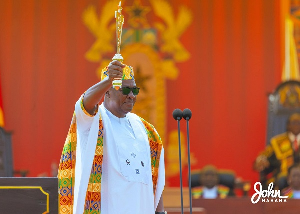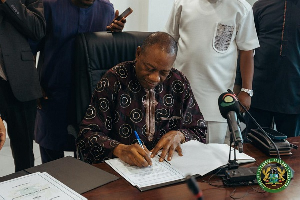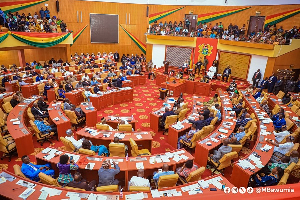– A Lesson for every office Holder.
Ever since Ghana gained its political independence from colonial rule, her traditional rulers have been at the forefront of its developmental process, mainly in the agricultural sector. However since the Asantehene Otumfuo Nana Osei Tutu II and later Akyemhene Osagyefo Nana Amotia Ofori Panin II launch their Education Fund and other schemes increasingly traditional rulers have got involved in canvassing for investments from their subjects both at home and in Diaspora. Others are formulating their own poverty reduction strategies including educating the public on the HIV/AIDS to compliment the government own strategies in their traditional areas.
The role increasingly taken on by these traditional rulers, majority with first class University degrees and proficient in International Business, in the developmental race for the country to achieve its cherished goal of becoming a middle income country by the year 2020 should be supported by all. Ghana stands on the threshold becoming a great nation with the current crop of leaders (Politicians and Nananom) all sharing the same developmental ambition.
Nananom were the first to realised the economic and intellectual power of the sons and daughters in Diaspora well before the politicians and promptly began to take notice, with some travelling at their own expense to remind citizens of the problems back home and the progress being made to make to uplift the country from poverty.
In sub-Saharan African countries with no form of Social Security, the massive cuts in education and health spending and the large unemployment and under-employment have thrown a large majority of our people into poverty. The impact of the user fees on education and primary health is the most worrying aspect which if not checked can seriously dent the 2020 Vision.
The Alma Atta Declaration is still an illusion for most sub-Saharan African countries including Ghana. However the criticism by John Atta Mills and Dr Mahama that the government of John Kufuor is responsible for the current situation in education is just wrong. Kufuor administration inherited the structural policies from the NDC government of which John Atta Mills was part. Both Dr Mahama and John Atta Mills understands and knows that the Structural Policies that were pursued by the Rawlings Administration was the only option that Ghana had at the time, however its implementation and its impact on the Ghanaian people was what some academics and politicians criticised. The Structural Policies were dictated to the Ghanaian government by the World Bank/IMF staff based at the Finance ministry in Accra.
Realising the high illiteracy and massive unemployment of the youth was what prompted Otumfuo Nana Osei Tutu and Osagyefuo Nana Amotia Ofori Panin, both brilliant and successful businessmen in their private lives, to act. An act that should shamed all our political leaders who are using and had political office to amass ill gotten wealth. They should look at the examples of our Nananom and Ya Nas and their selfless call to duty by forgoing all the luxuries in life, and yes! Majority in fact did lived comfortably in Diaspora and had successful occupations, to answer the call of the Motherland. Nananom have been taking the lead in reminding Ghanaians everywhere of their fundamental duties---- to remember that our formative careers were nurtured in Ghana. Even in the heady days of “Aluta”(student uprisings), Ghana’s universities, University of Ghana, University of Science and Technology were producing brilliant scholars, majority of who are excelling in Diaspora. Ghana invested heavily in primary and secondary education soon after independence. Dr Nkrumah established free education for the Northern half of Ghana and scholarship fund for the cocoa-growing farmers, a policy that Dr Busia continued. The debt crisis and Ghana’s “successful” implementation of the Structural Policies with the introduction of user fees reversed the early gains that she made in both the health and education sectors. The painful “Brain Drain” still going has turned the country into a beggar state. But the selfless devotion to call of duty by our Nananom shows that the will is still there… but the question how can this be turned into reality. Some would argue that our Nananom are royals and hence will not or have not experience the level of poverty that they are pledging themselves to eradicate. This might be true, but then it should be realised that our current crop of Nananom are well educated and majority had high profile jobs in both the corporate world, World bodies and in academia as are countless others yet these royals put duty (some living in Ahenfie with bare necessities) before selfish interests. Others are playing major roles by combining both functions such as Nana (Dr) Otuo Achampong. The passion and the scale of the knowledge of their brief at international forums when canvassing for investments for Ghana should make every Ghanaian proud. Listening to Nana Otumfuo Osei Tutu at Alexander Palace during the Ghanaian Business promotion (Nana was talking to a group of foreign investors) made me realised how useful and important our royals are to our development. I also had the opportunity to watch a videotape of Nana Amotia Ofori Panin in a similar function in Washington, DC, and Nana Otuo Achampong in London. These sons, to use a cricket phrase, “ are batting for Ghana”, however the number of years one has been away from the Motherland, their speech draws one closer home. Both Dr Mahama and Professor John Atta Mills should realise that the street children that they are blaming on the present Kufuor government were the results of some of the policies of the past governments. Since majority of the population live in the rural areas, much emphasis should have been given to small-scale enterprises in the rural areas with Gender being top of their agenda. Both Senegal and Uganda implemented the same structural policies in the 1980s, however Uganda did not introduce user fees at the primary level, hence there were huge increase in school going children, a policy which has been hailed as a success. It is the same World Bank/IMF policies that the current government is implementing under the HIPC initiative, but the only difference is corruption has been cut to the minimum under Kufuor. Now that our Nananom are taking over more social responsibilities, perhaps sending our Nananom to represent the country in the Industrialised countries would save the taxpayers money than sending the speaker to a first class clinic overseas. The institution of Chieftaincy has turned the tide on our corrupt politicians.
They have brought the meaning of “Hen Ara hen Asasi Ne”. God Bless Ghana.
P. Jeffrey MSc, BSc. London.














